Marchés
Lors de la conception d’une intervention humanitaire et de la prise de décisions quant à l’utilisation des transferts monétaires, l’analyse générale des options de réponse doit inclure une analyse de marché. Il est prouvé qu’offrir un soutien ciblant le fonctionnement des marchés accélère la reprise et accroît la résilience dans les zones affectées par une catastrophe.
De nombreuses organisations ont investi dans la mise au point d’outils visant à faciliter l’analyse de marché et réfléchissent à la mise en place de programmes basés sur les marchés plus holistiques. Elles envisagent des interventions tirant profit du marché (basées notamment sur des transferts monétaires aux populations affectées), ainsi que des interventions soutenant directement les marchés (comme l’octroi de subventions conditionnelles aux vendeurs/euses pour la remise en condition du marché).
Initiatives associées
Contenu associé

1.2 Introduction à l’analyse de marché
Cours
Ce cours de 30 minutes offre une introduction à l’analyse de marché pour les contextes d’urgence. Il contient des contributions d'experts dans ce domaine. Ce cours a été développé en collaboration avec l'International Rescue Committee et le CALP Network et grâce au financement d’USAID/OFDA et de l’Agence Suisse pour le Développement et la Coopération. Il est destiné aux...

2.4 Un guide pratique pour l’analyse de marché
Cours
Ce cours en ligne de 3.5 heures vise à fournir aux équipes qui conduiront des analyses de marchés en contextes humanitaires une compréhension approfondie de la théorie et des étapes à suivre afin de leur permettre de comprendre le pourquoi et le comment du processus à suivre. Les participants seront guides à travers un scenario d'analyse de marchés d'urgence. Ce cours s'appuie sur...
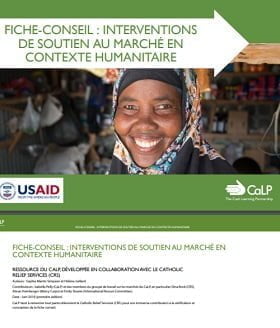
Fiche-Conseil : Interventions de soutien au marché en contexte humanitaire
Guides et outils
La fiche conseil définit le programme de soutien au marché en contexte humanitaire et le décrit dans la pratique. Elle permet aux praticiens humanitaires d’envisager systématiquement des interventions de soutien au marché, parallèlement à d’autres activités du programme. Le champ d’application comprend des interventions de soutien au marché axées sur l’offre/la disponibilité...
Thematic lead
Latest

An Agenda for Cash – Part of the CALP Network’s ‘100 days of cash’ initiative
Guidelines and Tools
The ‘Agenda for Cash’ provides a snapshot of what more than 40 organisations believe needs to change in relation to cash transfer programming at this precise moment in time. Implementers themselves have created it, through a collaborative process facilitated by the CALP Network to influence the Grand...
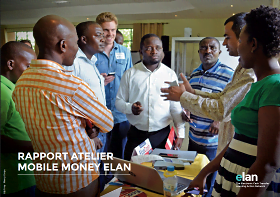
Rapport Atelier Mobile Money ELAN
Rapport
Dans une étude récente menée par NetHope sur les paiements mobiles en masse, il est estimé que les programmes humanitaires de cash transfert pourraient potentiellement générer chaque année entre USD$19 et 37 millions en frais de transaction pour les prestataires de services financiers.
Cependant,...

Humanitarian Cash Transfer Programming Symposium – Cash based responses in North-eastern Nigeria: harmonising CTP approaches, sharing learning and cash transfer mechanisms experiences
Report
With the increasing use of cash based responses in NE Nigeria the humanitarian organisations identified the need to share the knowledge and experiences that exist to date. The Humanitarian Cash Transfer Symposium was a structured workshop for humanitarian organisations to share experiences, learnings, and...
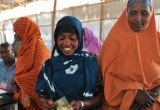
Responding to Diverse Needs: Multipurpose Cash Grants
Blog Post
The growing use of cash transfers across a wide range of sectors provides opportunities for a paradigm shift to a more dignified, holistic approach to humanitarian assistance. Learn how UNHCR, in coordination with partners such as Oxfam, Save the Children, and the IRC, are using multipurpose cash grants...

E-Vouchers for Syrian Refugees in Turkey: Challenges and lessons learned around vulnerability, targeting, and protection
Blog Post
There are more than 2.5 million Syrian refugees living in Turkey. The vast majority of these individuals have settled in cities, not camps, and therefore receive minimal or no humanitarian assistance to help meet their basic needs. In response to this gap, the Danish Refugee Council (DRC) in Turkey...
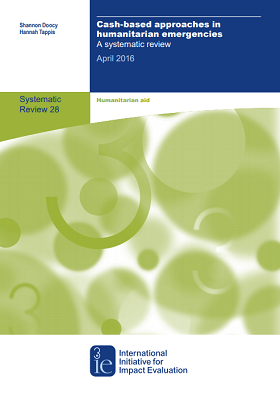
Cash-based approaches in humanitarian emergencies A systematic review. April 2016
Report
Humanitarian actors have a responsibility to ensure that assistance is provided in a way that minimizes risks and maximizes benefits to people affected by crisis. However, there are many challenges in evaluating ‘what works’ in addressing the needs of crisis-affected populations, and translating...

The Use of Cash Transfer for Livelihoods: Considerations and lessons learned
Blog Post
As the use of cash transfer programming increases, questions of how it can be used both to meet short-term relief needs and to contribute to recovery and longer-term development become more pertinent. In particular, the use of cash transfers to meet livelihoods objectives can be a highly effective means...

Cash Working Groups: A preliminary mapping
Report
Brief overview of the state of cash working groups in emergency settings.
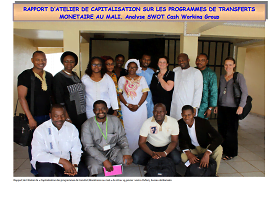
Rapport D’atelier De Capitalisation Sur Les Programmes De Transferts Monetaire Au Mali, Analyse SWOT Cash Working Group
Rapport
Dans le cadre de la mise en œuvre des programmes de transfert monétaire au Mali, a vu le jourun Groupe de travail appuyé par le CALP Network. Depuis 2013, sous l’impulsion d’Oxfam, de Save the Children et d’UNICEF, le Cash Working group a été mis en place au Mali. Oxfam assure le lead du Cash...

Guide pour la protection dans le cadre des interventions monétaires
Guides et outils
Ce guide identifie les informations minimum nécessaires et les ressources clés visant à aider les professionnels de l’humanitaire à s’assurer que les risques et les bénéfices en matière de protection soient pris en compte et fassent l’objet d’un suivi tout au long du cycle d’un...

Scaling Up Humanitarian Cash Transfers in Nepal
Case Study
The Nepal earthquake has a number of lessons for the global debates on scaling up cash both at the level of cash responses themselves and in the more transformational way envisaged by the High Level Panel through which cash can disrupt the established humanitarian system. Humanitarian cash transfers after...

Research: Refugees Can Bolster a Region’s Economy
Report
The world’s refugee population has increased sharply in recent years, leading governments to argue over which countries should take in people displaced by war or other calamities. At the core of this debate is cost: refugees are usually considered an economic burden for the countries that take...
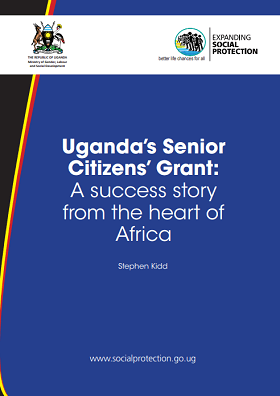
Uganda’s Senior Citizens’ Grant: A success story from the heart of Africa
Report
Since 2011, a pilot universal old age pension – known as the Senior Citizens’ Grant (SCG) – has been implemented in Uganda. By 2016, there were 125,000 beneficiaries. A number of studies have demonstrated that the scheme has had significant benefits. Despite the general economic situation worsening...
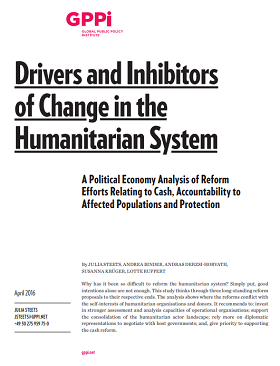
Drivers and Inhibitors of Change in the Humanitarian System
Report
This study analyses the drivers and inhibitors of change in the humanitarian system. It focuses on three reform efforts: cash-based emergency response, accountability to affected populations and protection. For each area, the study explores four questions to help explain why reforms are successful or...

Recommandations clés pour assurer la protection dans le cadre d’interventions monétaires
Guides et outils
Recommandations clés pour assurer la protection dans le cadre d’interventions monétaires

Baseline Assessment for Education Cash Transfer Programming for IDPS in Dahuk Governance
Report
REACH, in collaboration with UNICEF, conducted a Baseline Assessment of Access to Education among Internally Displaced Persons in the Dahuk Governorate of Iraq. This assessment aimed to improve the efficiency of humanitarian cash assistance by implementing partners for increased access to education in the...
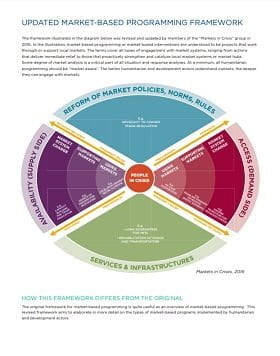
Updated Market-Based Programming Framework
Guidelines and Tools
The Market Based Programming framework was designed to help humanitarian actors understand market approaches in fragile contexts. Some degree of market analysis is a critical part of all situation and response analyses. At a minimum, all humanitarian programming should be “market aware”. The better...

Afghanistan Emergency Response Mechanism (ERM)
Report
The Afghanistan Emergency Response Mechanism (ERM) was selected as a case study to illustrate the ‘alliance’ form of inter-agency collaboration for sector-focused cash assistance, with semi-formal relationships and separate funding flows between members. It is distinctive from other cases in that cash...

Conseils pour assurer la protection dans le cadre des interventions monétaires
Guides et outils
Conseils pour assurer la protection dans le cadre des interventions monétaires
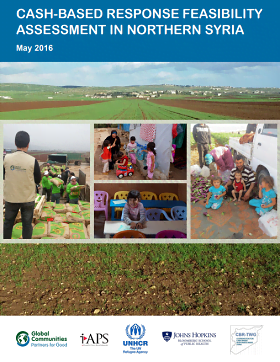
Cash-based Response Feasibility Assessment in Northern Syria
Case Study
As the conflict in Syria extends beyond the fourth year, there is need for a widespread humanitarian response focused on urban areas that addresses humanitarian needs and promotes resilience for the 13.5 million people in need of protection and humanitarian assistance within Syria. The majority of...
